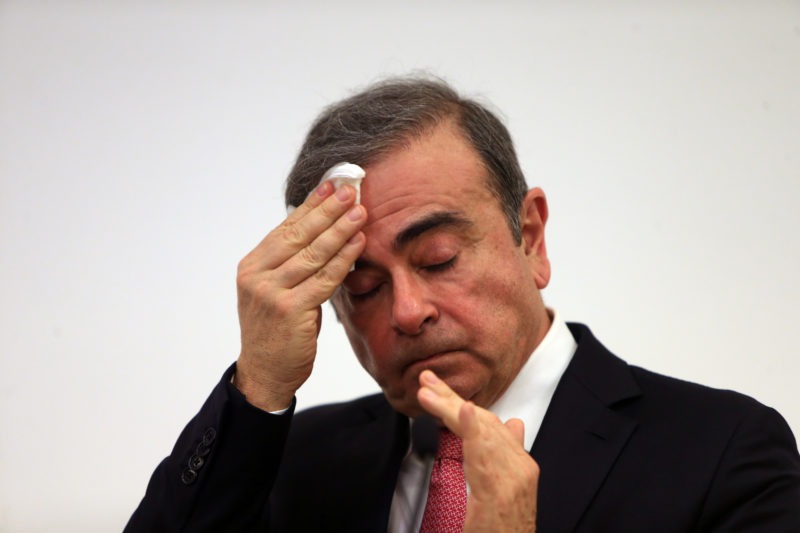Lebanon bans Ghosn from foreign travel
Former Renault-Nissan boss Carlos Ghosn mops his brow as he addresses journalists on his reasons for dodging trial in Japan (-)
Beirut (AFP) – Lebanon banned former auto tycoon Carlos Ghosn from travel Thursday and asked Japan to hand over his file on financial misconduct charges, as Tokyo urged the fugitive businessman to return.
The 65-year-old businessman — for years venerated in Japan for turning around once-ailing Nissan — fled while awaiting trial on charges including allegedly under-reporting his compensation to the tune of $85 million.
His shock arrival in his native Lebanon last month was the latest twist in a story worthy of a Hollywood plot and prompted outrage from the Japanese government as well as from Nissan.
A day after Ghosn made an impassioned defence in front world media of his decision to jump bail and flee Japan, Ghosn on Thursday morning gave testimony to Lebanese prosecutors over an Interpol “red notice” urging his arrest.
“The state prosecution issued a travel ban for Ghosn, and asked for his file from the Japanese authorities,” a judicial source told AFP.
A second judicial source said Ghosn had been asked to hand over his French passport and banned from travelling abroad until his judicial file arrived from Japan.
“According to what is inside the file, if it appears that the crimes he is accused of in Japan require being pursued in Lebanon, he will be tried,” the source added.
“But if it doesn’t require being pursued under Lebanese law, then he will be free.”
– Travel to Israel –
At Japan’s request, Lebanon’s judiciary received a “red notice” from Interpol last week urging Ghosn’s arrest.
A “red notice” is a request to police across the world to provisionally detain a person pending extradition, surrender or similar legal action. It is not an arrest warrant.
But Lebanon does not have an extradition agreement with Japan.
Ghosn also made a statement to prosecutors on Thursday on a report submitted by Lebanese lawyers that he had travelled to neighbouring Israel as head of Renault-Nissan, despite a ban on Lebanese visiting the Jewish state.
Lebanon and neighbouring Israel are technically still at war.
In early 2008, Ghosn travelled to Israel to announce the mass production of electric vehicles there with the cooperation of Renault-Nissan.
At a press conference in Beirut on Wednesday, Ghosn apologised to the Lebanese people for having visited the country.
“I went as a Frenchman because of a contract between Renault and an Israeli company,” said Ghosn, who holds French, Lebanese and Brazilian nationalities.
“I always come back to Lebanon and nothing has ever happened before,” he said.
At his first public appearance since his escape to Lebanon, he slammed Japan’s judicial system and said he had been forced to flee because he would not get a fair trial.
“There was no way I was going to be treated fairly… this was not about justice,” he told reporters, responding to questions in English, Arabic, French and Portuguese.
– ‘Presumed guilty’ –
Ghosn said he was “presumed guilty before the eyes of the world and subject to a system whose only objective is to coerce confessions, secure guilty pleas.”
The ex-chairman of Nissan-Renault faces four charges of financial misconduct in Tokyo, which he alleges were cooked up by disgruntled executives at Nissan in collusion with Japanese prosecutors.
Japan’s Justice Minister Masako Mori earlier Thursday said the accusations were “baseless” and urged Carlos Ghosn to return and make his case in court.
“If defendant Ghosn has anything to say on his criminal case, he should make his argument in a Japanese court and present concrete evidence,” she said.
“If he claims innocence, he should face a trial under the justice system in Japan, where he was doing business, and he should submit evidence to prove his claims,” Mori said.
The businessman was out on bail in Tokyo when he launched his audacious escape plan, and said he decided to flee after his lawyers told him he could wait five years for a verdict.
He also accused prosecutors of imposing strict conditions on contacts with his wife Carole in a bid to “break” him.
Prosecutors in Tokyo this week obtained an arrest warrant for Carole, who is also in Lebanon, alleging she lied to a Japanese court.
On Wednesday, Ghosn refused to shed any light on how he managed to slip past authorities and flee Japan at the end of December — an astonishing feat given his high-profile status and the restrictions he faced.
Under his bail terms, his passports were confiscated, his home monitored and his internet access limited to a computer at his lawyer’s office.
bur-strs-ah/hc
Disclaimer: Validity of the above story is for 7 Days from original date of publishing. Source: AFP.


